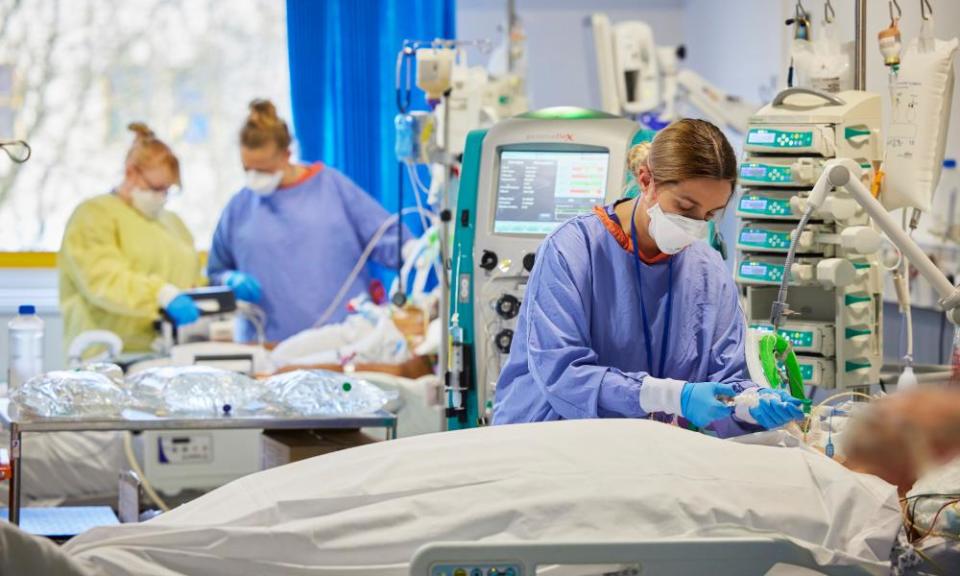Covid in England: how the NHS could be hit this winter

Despite the Omicron coronavirus variant reaching the UK, with its threats of accelerated transmissibility and vaccine evasion, there remains a certain complacency about its potential impact on the NHS.
The argument being put forward can be boiled down to: “The NHS was treating far more Covid patients at points in the pandemic than it is now, so what’s the problem?”
The noises from within the NHS itself, however, are far more ominous. The health service is not exclusively Covid oriented, nor are its human resources endlessly resilient.
A big driver of every previous lockdown measure has been the potential impact of the virus on the health service.
Twenty months into the pandemic here are some of the data points that remain of concern.
In November 2020, as the race was on to introduce vaccine programmes, the NHS was treating an average of 16,000 patients a day across the UK. In the month this year the same figure was close to 8,500.
The latest available data for November this year shows that, in England, the proportion of all beds occupied by Covid patients stood at 6.7% (at the height of the pandemic in January Covid patients made up a third of all patients).
But while this figure is low relative to the same time last year, there is another compounding pressure on the NHS – a massive backlog of non Covid-related procedures that also require resourcing.
In September 5.8 million people were on waiting lists in England alone, the highest figure in close to 25 years. In September one-third of patients awaiting treatment – or 2 million in total – were waiting more than four-and-a-half months to be seen.
In the seven days to 23 November, 92.9% of all beds were occupied across the NHS England area (85% occupancy is the accepted international standard and 95% is seen by medics as dangerously high).
Aside from the potential for increased workloads in the health service, NHS Employers has warned that the variant could cause an increase in the already high numbers of staff off sick. The NHS is all too aware that even those who are fully vaccinated may still require its care.
Between 25 October and 21 November, with the Delta variant as the dominant variant in the UK, there were 9,174 Covid-19 cases presenting to emergency care that led to an overnight admission, according to data from the UK Health Security Agency. Of these, 5,689 (62%) were double vaccinated. This rate is lower than for the overall population though – almost 80% of eligible people are now double vaccinated.
Only 11.5% of people eligible for a jab are unvaccinated but they make up more than a third of the overnight hospital admissions.
Despite the proportion in hospital of those who are double vaccinated being lower than for the overall population, high coronavirus rates and varying immune responses still lead to thousands of double-vaccinated people being exposed to the coronavirus and ending up in hospital.
The risk for those double-vaccinated increases significantly with age. The hospitalisation rate within 28 days of a positive Covid test stood at 152.5 per 100,000 among unvaccinated over-80s, compared with 51.8 per 100,000 for double-vaccinated over-80s.
The fear is that Omicron, if it can evade the protection given by the vaccines, may worsen the situation.
According to the latest data from NHS England, up to 28 November four in five people aged 12 or older had received two doses of a Covid-19 vaccine. The equivalent figure for first doses was 88%.
Take-up of first and second doses varies significantly by age, the latest data shows. The NHS estimates that virtually all adults aged 75-79 have been fully vaccinated, compared with just 66% of those aged 18-24.
In an effort to combat the Omicron variant, the government announced on Monday that adults aged 18-39 would be called to receive a booster jab. The latest NHS data shows 53% of the over 40 population has received a booster jab; younger age groups will be able to access a third jab in the coming weeks.
The rate of booster dose uptake has been steadily increasing over the course of November with about 350,00 people daily receiving a booster vaccine on average.
default
With the first Omicron infection cases only now being detected it is too early to say what impact this variant may have on case numbers; reliable case data run at a five-day delay, and the first cases of the variant in the UK were only detected in recent days.
What we do know is that cases have risen again in recent days. Close to 54,000 infections were reported on Thursday, the 12th highest recorded in one day.
With reports of the Omicron variant fuelling an “exponential” rise in Covid cases in South Africa, including increased reinfections, NHS heads will be closely monitoring all these data points as the service approaches its busiest time of the year.

 Yahoo News
Yahoo News 